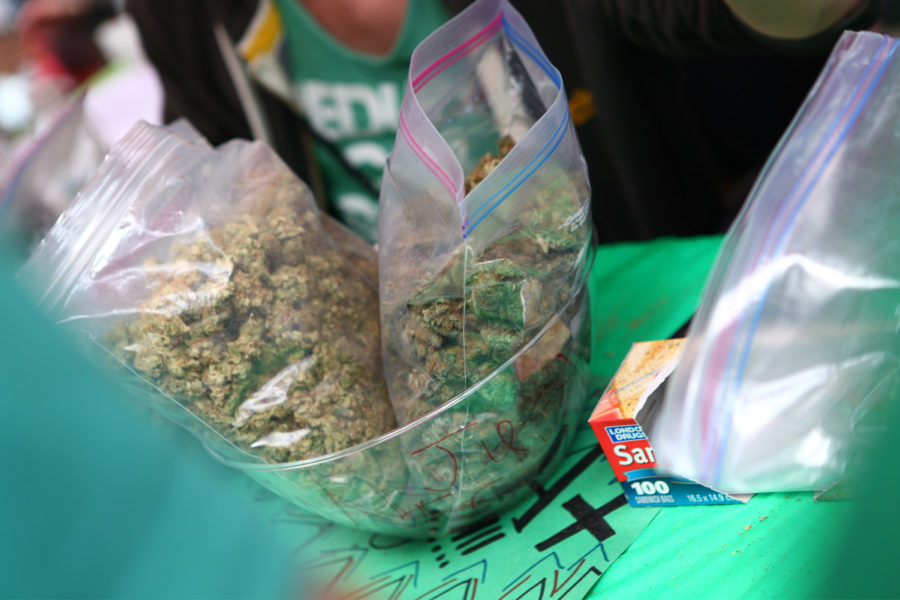Saint Louis County Ceases to Prosecute Marijuana Possession
Labeled for noncommercial reuse by Flickr.
While some may believe the January decision by the Saint Louis County to no longer prosecute the possession of less than 100 grams of marijuana has effectively legalized the substance, they would be wrong.
Despite the change in county policy, which was announced by Circuit Attorney Kim Gardner on Jan. 2, Associate Principal Dr. Steve Hankins said the procedure for the possession of illicit substances will remain the same at school.
“Marijuana is still illegal in the state of Missouri,” Dr. Hankins said. “It is still something that the School Board and the district consider intolerable for students. We take it very seriously so the consequences will remain the same.”
All students who come onto campus in possession or under the influence of marijuana will continue to face an automatic 10 day out-of-school suspension along with possible referral.
“We’d still contact the resource officer if someone got in trouble for possession on campus,” Dr. Hankins said. “He’d still issue them a ticket and a summons, and then it would move on from there.”
School Resource Officer Steven Aspinall said that actually very little has changed in the realization of county policy in respect to marijuana possession.
“It’s not that you’re not going to get prosecuted for it – you’ll still be charged and prosecuted but it’ll go through a municipality instead of Saint Louis County,” Aspinall said. “We can still send you through our [municipality] court; it just won’t get sent through a Saint Louis County court.”
Though this change is an adoption by the County based on very similar policies that the City of Saint Louis passed in 2018, Officer Aspinall is uncertain of what it will mean for the potential legalization of marijuana in Missouri.
“I think it might lead to that change, but I don’t know,” Aspinall said. “We’ll just have to wait and see.”
Students Against Destructive Decisions (SADD) President Maggie Yang, senior, is opposed to potential legalization.
“While I can understand why people advocate for the medical uses and get sucked into the benefits of legalizing medical marijuana, I personally believe that the facts against legalizing are clear and that more substance abuse could result from it,” Yang said.
Yang is proud of SADD’s advocacy for substance abuse prevention. From the annual Car Bash fundraiser to meeting with state representatives in Jefferson City at the Speak Hard event, SADD works hard to raise awareness about the issues posed by substance abuse.
“I would like to say [MHS drug usage has] decreased in the fact that there has been more awareness raised,” she said. “More people are willing to hear our case against substance abuse.”
Marshall Arebalo, senior, however, is still quite certain of the usage of marijuana by students and said this will continue after the policy shift .
“There are 2,400 kids at MHS, and I assure you that at least a handful of them use marijuana on a regular basis,” Arebalo said. “I’m sure that being stopped with marijuana will happen to at least a few after this new county policy goes into action.”
Arebalo supports the legalization of both medical and recreational marijuana, but he understands opponents’ caution when it comes to substance abuse.
“Personally, I have lost friends and family to opioids, so the conversation on drugs really hits me there,” Arebalo said. “Those are very high-grade substances, and they’re extremely addictive. A person only has to use one a handful of times to become dependent.”
To Arebalo, the limit of 100 grams of marijuana is somewhat excessive. He said he would prefer something closer to 30 grams. Arebalo cautions that even with more relaxed laws, marijuana users must be aware of the potential repercussions.
“Marijuana can definitely hurt people’s lives and that’s the responsibility part,” Arebalo said.
“They’ll have to know how to limit themselves and how to still function even if it does become legal.”
Your donation will support the student journalists of Marquette High School. Your contribution will allow us to purchase equipment and cover our annual website hosting costs. You may become a PATRON by making a donation at one of these levels: White/$30, Green/$50, Blue/$100. Patron names will be published in the print newsmagazine, on the website and once per quarter on our social media accounts.

Michael Schmitz, senior, is a foreign correspondent for the Messenger. During his time in Israel, he will utilize his background in political analysis...












